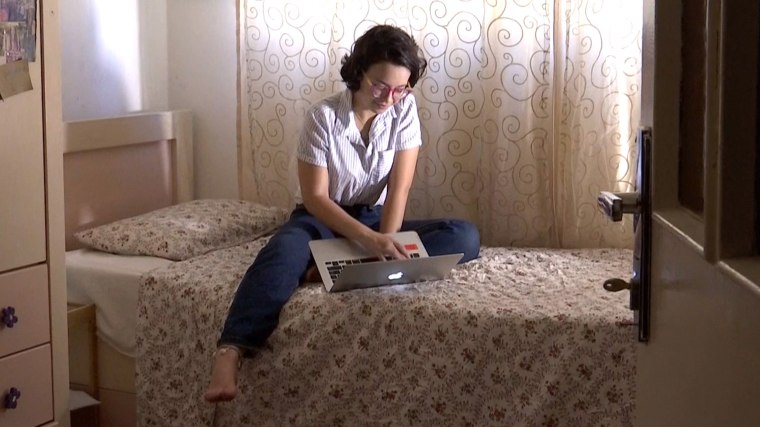JERUSALEM — A teen who won a scholarship to Georgetown University after writing an impassioned essay in the wake of the U.S. decision to move its embassy to Jerusalem has been given the rare opportunity of meeting Britain's Prince William.
"Oh my God," Palestinian Malak Abu Soud, 17, told NBC News Thursday. "It was very exciting and a really good meeting. He was a great listener and promised to work on the subjects I raised, like the lack of working permits, unemployment and educational scholarships."
"He was very tall and I could barely talk since I was so excited," she added.

The Wednesday meeting happened as the Duke of Cambridge made the first official visit by a British royal since the U.K. ended its rule over what is now Israel and the occupied Palestinian territories.
Earlier Soud said talking to William would be a “once-in-a-lifetime opportunity,” adding that she had written to the British Consulate recommending they set up the meet.
In the essay for Georgetown, Soud said she "talked about Jerusalem itself, what it means to me, what I love about it and that my ancestors are very important to this city, and that completely deleting them off the map is not good for Jerusalem or for the Israelis or the Palestinians.”
“And from there I got in," she said.
Soud wrote the piece after President Donald Trump announced the U.S. embassy's move from Tel Aviv to Jerusalem. The relocated facility opened its doors in May.
William had said he was “very much looking forward” to going to the Old City in eastern Jerusalem. Israel captured eastern Jerusalem, Gaza and the West Bank — land Palestinians want for an independent state — after the 1967 Arab-Israeli war.
The prince has already visited religious sites, honored Holocaust victims in Israel. He met with Israeli and Palestinian leaders as part of the tour — which, like other overseas visits by British royals, is non-political.
But the second-in-line to the throne will have to navigate the political and religious divisions in the region which was once administered by colonial Britain in the final days of its empire.
In east Jerusalem, the sacred place at the heart of the Israeli-Palestinian conflict, William viewed the walled Old City from the Mount of Olives. Home to important holy sites for Christians, Jews and Muslims, east Jerusalem is claimed by Palestinians as the capital of a future state.
Soud said that Jerusalem residents have a unique perspective on the conflict because Palestinians and Israelis mix in the city every day, adding that she often frequents the Jewish quarter and visits the Israeli shopping mall.
“As a Jerusalemite who is Palestinian I know about Shabbat, I know about Israelis, I know how things work here,” she said, referring to the Sabbath, or the Jewish day of rest.
“It's everybody's city,” she said. “I know whatever happens with both countries, Jerusalem is always going to be that shared point and anybody that lives in Jerusalem is going to be more empathetic toward the other side than other people from more extreme parts of the country," she added.
Soud, who is due to leave for the U.S. in August, said she won her place at Georgetown University after she wrote to the school explaining that erasing her ancestors’ history in Jerusalem would not help anyone. While being pro-Palestinian, Soud said she tried to be balanced in her essay by being understanding that both sides have to live in the city.
Paul Goldman reported from Jerusalem, and Saphora Smith reported from London.
